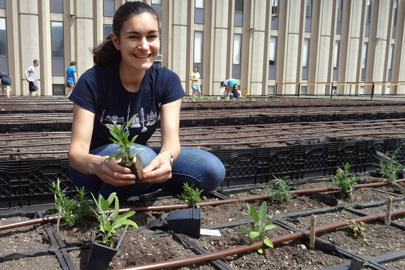New rooftop farm showcases Brandeis’ green thumb
Renovated outdoor space offers environmental benefits
Brandeis’ care for the environment has sprouted another set of roots on campus: a 2,000-square-foot roof farm atop the Shapiro Science Center’s Leo Gerstenzang Science Library, constructed with a $30,000 grant from the university’s Sustainability Fund.
Fruits, vegetables and flowers are planted in 1,500 milk crates filled to the brim with soil and watered via a timed drip-irrigation system. The space is maintained by the Brandeis Rooftop Community Farm club. The project and club originated in the hands-on “Greening the Ivory Tower” experiential-learning course taught by Professor Laura Goldin.
“Professor Goldin empowered us to create an initiative that could improve sustainability on campus,” says Allison Marill, a rising junior from Atlanta, Ga., who co-founded the club. “This wasn’t just a class assignment for us. Once we did our research and saw that urban farming is an up-and-coming thing, we became even more passionate about it.”
Students on campus this summer have been maintaining the plants along with staff from Green City Growers, a Boston-based group that encourages and fosters local farming.
“The more food we grow in areas where people can have access to it, the better, regardless of whether it’s grown on a college campus or somewhere in the city,” says Green City Growers member Marie Macchiarolo.
“This rooftop farm has lots of environmental benefits, too,” she adds. “There’s no shade here, and the space is all brick. These plants will reduce the heat that’s coming off the building, reducing the amount of air conditioning these buildings will have to use.
The farm is expected to yield a number of herbs, fruits and vegetables throughout the summer and fall. Planted crops include tomatoes, onions, squash, green beans, lettuce, basil, parsley, broccoli, strawberries, catnip, kale, zucchini, potatoes, bok choy, rhubarb, cherry tomatoes, beets and carrots.
Faculty and staff in the Community-Supported Agriculture program will receive some produce in exchange for donating their time to the garden’s upkeep. However, a larger portion of what’s grown will either go to food banks or be sold at a farmers’ market so the club can continue investing in the rooftop farm.
The club hopes its efforts will not only make a positive impact on the environment but will also boost urban-farming awareness and give the campus a new social hangout.
“I’m not a science student, so I had never been up to the Gerstenzang roof,” said Marill, an environmental studies and economics double major. “But this opens the roof up and gives the community a whole new space.”
Categories: General, Research, Science and Technology, Student Life






